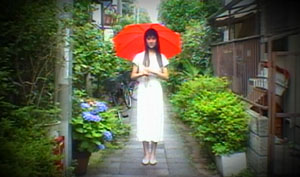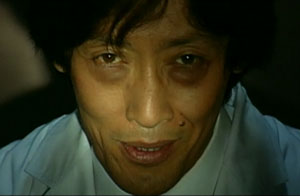Long Dream is Higuchinsky’s second stab at adapting the manga of Junji Ito to film (this time for TV) after the wonderfully weird Uzumaki. I’ve been a fan of Uzumaki for years now, and not until recently have I noticed people  mentioning how much they despise it. This completely puzzles me, as the film is unquestionably the best representation of Ito’s manga put to celluloid. If you’re one of the haters, stay far away from Long Dream. If you enjoyed it however, you’ll find a lot of the same things to like here, albeit in a much reduced form.
mentioning how much they despise it. This completely puzzles me, as the film is unquestionably the best representation of Ito’s manga put to celluloid. If you’re one of the haters, stay far away from Long Dream. If you enjoyed it however, you’ll find a lot of the same things to like here, albeit in a much reduced form.
Dr. Kuroda runs a psychiatric hospital, and since his wife died has poured all of his attention into his patients. One of them, named Tetsuro, is an especially interesting case. He came to Dr. Kuroda claiming that he actually felt the passing of time when he awoke from his dreams. In other words, if he had a dream that lasted a month, when he awakened, he felt as though he had actually spent a month in his dream and that the day before was a month in the past. At first, Dr. Kuroda thinks Tetsuro is just a head case, but over the next few days of observation, Tetsuro begins to report that his dreams are getting increasingly longer, and the toll on his body begins to become apparent.
As the dreams get longer, Tetsuro’s appearance begins to change. While his body isn’t exactly aging, it seems as though his brain is actually living though the time in his dreams, and as such, his brain is now much farther into the future than what Tetsuro’s actual body is, and his body begins to reflect what it would look like hundreds of years from now. Dr. Kuroda begins to see this as a means to live forever, at least mentally, and becomes obsessed with finding out what is causing it to happen. He’ll stop at nothing to discover the truth, including losing his own grip on sanity.
Clocking in at a meager 59 minutes, Long Dream translates the bizarre world of Junji Ito flawlessly to the small screen. Most of Ito’s work consists of short stories, ones that begin and end in 30 or so pages. Uzumaki ran for much longer, but all of his Tomie stories as well as the rest of his manga that has be adapted for the screen have been based on short, to-the-point stories. I think this lends to why so many films based on Ito’s work fail: there’s just not enough meat in the source stories to pad out a feature length film.  I’ve always wondered why no one has done an anthology film based on his work, as that format would lend itself much better. But luckily, Higuchinsky realized the quandary he was in, and we get a film that clocks in under an hour. The shorter runtime works wonders, and really captures the spirit of what Junji Ito’s work is all about.
I’ve always wondered why no one has done an anthology film based on his work, as that format would lend itself much better. But luckily, Higuchinsky realized the quandary he was in, and we get a film that clocks in under an hour. The shorter runtime works wonders, and really captures the spirit of what Junji Ito’s work is all about.
The main basis of Long Dream, ruminating on what would happen if the passing of time in the dream world was actually felt once awakened, is really a fascinating one. Imagine going to sleep, having a dream that spanned hundreds of years, and then waking feeling as if those years actually did pass, and yesterday is a distant memory. I found this to be a gripping idea, and it got its hooks into me early on and was more than enough to pull me through the rest of the film. It’s pretty fresh, to me at least, and I’d love to see some other directors or writers explore the theme in the future with bigger budgets at their disposal. I also thought Higuchinsky did a good job of blurring the line between reality and hallucination, which always had me guessing what was taking place where. Being a film about dreams, the proceedings had a definite heady feel about them that complimented the story nicely.
As this is a made-for-TV film, the FX work is pretty low-brow to say the least. The make-up looks to consist of foam balls, cheap rubber, and wigs, and it won’t be fooling anyone anytime soon. In the world of Junji Ito though, the fake look of it all actually compliments the film. This is a surreal world, where we never exit the walls of the hospital (outside of a flashback or two), and it seems as though anything and everything can  happen in this normal-looking but secretly sinister place. The basic themes of the film are good enough that you’ll quickly accept the look of the FX as just another odd idiosyncrasy in this strange world. That’s not to say that there aren’t a few occasions where the effects come off well; seeing these strange faces in night vision is surprisingly effective and quite creepy.
happen in this normal-looking but secretly sinister place. The basic themes of the film are good enough that you’ll quickly accept the look of the FX as just another odd idiosyncrasy in this strange world. That’s not to say that there aren’t a few occasions where the effects come off well; seeing these strange faces in night vision is surprisingly effective and quite creepy.
The one real drawback of Long Dream is that at its heart, it is a production for TV, and as such it just doesn’t delve deep enough into things as it could have otherwise. I said I’d love to see other filmmakers explore the themes touched on in the film, and that’s mostly because I didn’t feel like they were tapped into as well as they could have been. The running time works because of the shortness of the source material, and keeps to it very well, but the idea behind the film is so grand that this is actually one of the few times where I believe it could have been opened up and examined to a greater degree. At the end of the day, we’re left with a film that’s just fine given the boundaries it was made in, but I can only imagine what it could have been like if the reigns were loosened and Higuchinsky was left to run wild.
If you’re a fan of Higuchinsky’s Uzumaki, Long Dream is a nice little after-dinner snack that compliments the main course nicely. Alternately, if you’re a fan of Junji Ito’s work, you probably already know that Higuchinsky is about the only guy out there that can do it justice, and Long Dream is no different. While it’s not as grand as maybe it could have been under different circumstances, what is there is an enjoyable way to burn an hour and delve into the mind of one of Japan’s most unique horror creators.
New kids on the block Bone House Asia have chosen Long Dream as their inaugural release on DVD, and do a pretty good job overall. The film is presented in non-anamorphic letterbox format, which is a bit of a disappointment, but overall it looks okay. The film was shot on video, so some of the discrepancies that come with that, like digital noise pop up now and again, but nothing too major. The Japanese language track is presented in Dolby Digital 2.0, and the removable English subtitles read well.
Extras include interviews with director Higuchinsky, manga creator Junji Ito, and actor Shuuji Kashiwabara respectively. Higuchinsky’s interview is the most interesting, featuring a mosaic over his face as he doesn’t want to be seen. He seems like a cool guy though, talking about his obsessions with Ito’s work, which is probably the reason why he’s the only person able to pull these adaptations off. Ito and Kashiwabara also speak on how meticulous he is in recreating the scenes from the manga, and how he always had a copy of the source in his hands to perfectly frame various shots. A trailer for the film, as well as trailers for a few other Bone House Asia and Tidepoint Pictures releases round out the disc.
Please feel free to discuss "Long Dream" here, in our forums!

